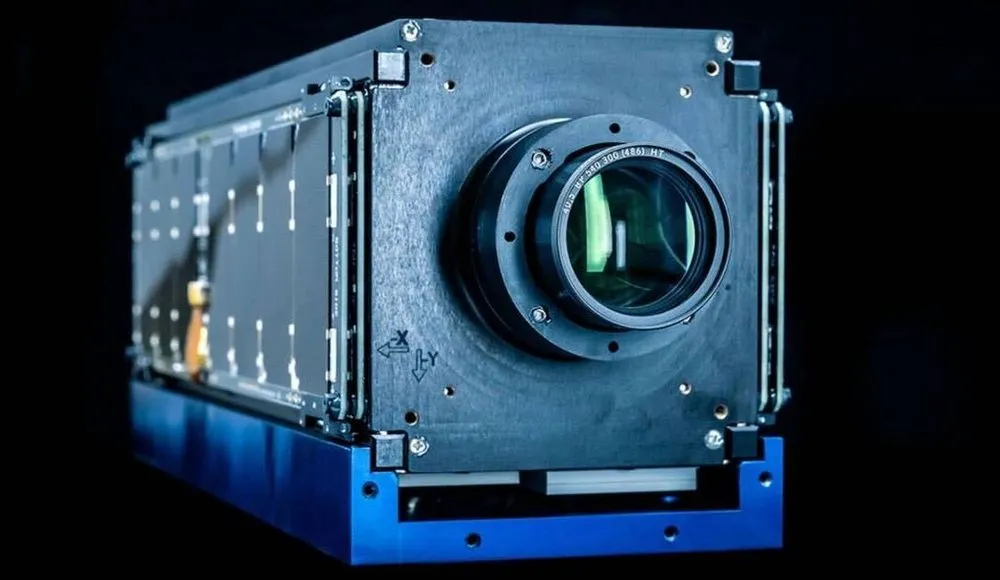This new satellite enters orbit with one mission: To get abused by hackers
If hackers get bored here on Earth, they'll soon have the chance to test their skills in space.
The challenge is this: during the DEF CON security conference in Las Vegas in August, they'll have to remotely hack the Moonlighter satellite, which successfully launched into space earlier this week.
Moonlighter is a 5-kilogram mini-satellite — about the size of a shoebox — that will be positioned in low-Earth orbit, waiting for one of the five DEF CON teams to uncover a method to hijack it and secure a grand prize of $50,000.
Moonlighter arrived at the International Space Station on Tuesday aboard SpaceX's Falcon 9, a small part of a 3,300-kilogram payload delivered to the station, including logistical supplies and essentials for the crew currently residing there.
Aerospace's Moonlighter will be the first on-orbit asset used for @hack_a_sat and the first-ever in-space platform used in a Capture-the-Flag exercise. More info: https://t.co/AEcd2hv6hH#38space #spacesymposium https://t.co/tEaRrS0jKr pic.twitter.com/K05vefIQ8b
— The Aerospace Corporation (@AerospaceCorp) April 19, 2023
The ultimate goal of the Moonlighter mission is to help researchers to safeguard satellite systems from being hacked in the vastness of space, long called the “next frontier” for cyber threats. All the way back in 2008, NASA warned of the consequences were hackers to intercept or tamper with communication between a spacecraft and ground control, and concerns have been growing ever since.
Satellite security is especially important during times of conflict, such as the war in Ukraine. At the onset of the invasion last year, Russian hackers directed their efforts towards the American satellite company Viasat, aiming to disrupt communications.
A recent study from the Cyberspace Solarium Commission recommended that the U.S. government formally name space a critical infrastructure sector and take steps to protect satellites and other space systems against cyberattacks.
With this as a backdrop, the Moonlighter satellite was created as a guinea pig for testing.
“Moonlighter is like a playground where we provide the space and the tools for professional hackers to perform cyber exercises,” said Aaron Myrick, project leader for Aerospace Corporation, a California-based federally-funded nonprofit that developed the satellite, with help from the Air Force Research Laboratory and Space Systems Command.
“We hope this will lead to more cyber-resilient architectures for future space missions.”
.@hack_a_sat was live & in-person this morning at @NASAKennedy for the launch of @SpaceX CRS-28!
— Hack-A-Sat (@hack_a_sat) June 5, 2023
Next step, #Moonlighter will be put into a Low Earth Orbit just in time for the final #HackASat4 competition at @defcon! Check out our website for updates! https://t.co/GMaiTV1CM4 pic.twitter.com/RrT55TZK8k
What makes this satellite valuable for researchers is that it uses an alternate communication method, without relying on traditional ground-based stations for communication and commands.
This feature enhances Moonlighter’s autonomy and resilience, ensuring it can recover and maintain communication even in challenging or compromised scenarios.
This, in turn, will allow cybersecurity professionals to do space-based cyber experiments that are “repeatable, realistic, and secure,” according to Myrick.
This is not the first attempt to simulate cyberattacks on satellites. Back in April, the European Space Agency (ESA) also carried out an exercise on ethical satellite hacking.
During the controlled intrusion, hackers found a way to access the satellite’s global positioning system, attitude control system, and even its onboard camera.
Last year, security researcher Lennert Wouters said he hacked SpaceX's Starlink satellite using a homemade circuit board. The hack was performed as a part of SpaceX's bug bounty program.
Cyberattacks on space tech like telescopes and satellites would be very costly if hackers managed to disable them. For example, it costs about $300,000 to launch one of Starlink’s nearly 3,000 satellites into orbit.
While the methods of hacking space systems — credential theft, phishing attacks, malware infections — are similar to those on the ground, the damage from such attacks can be harder to recover from.
“Space poses an acute cybersecurity challenge, particularly as nations launch connected assets that hold sensitive data or even key intelligence into orbit,” Josh Lospinoso, the CEO of cybersecurity company Shift 5, told The Record in November last year.
“The stakes are high because there’s no reset button in space.”
Daryna Antoniuk
is a reporter for Recorded Future News based in Ukraine. She writes about cybersecurity startups, cyberattacks in Eastern Europe and the state of the cyberwar between Ukraine and Russia. She previously was a tech reporter for Forbes Ukraine. Her work has also been published at Sifted, The Kyiv Independent and The Kyiv Post.



